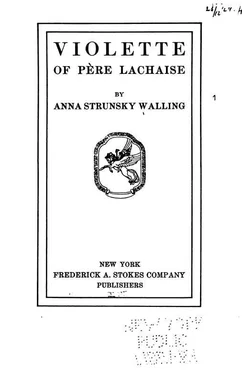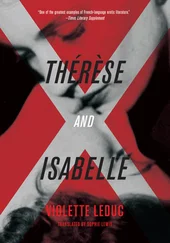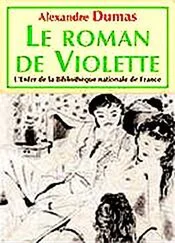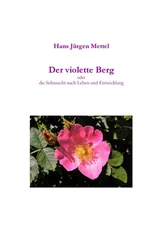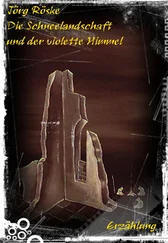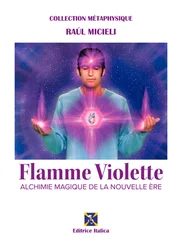Anna Strunsky - Violette of Père Lachaise
Здесь есть возможность читать онлайн «Anna Strunsky - Violette of Père Lachaise» весь текст электронной книги совершенно бесплатно (целиком полную версию без сокращений). В некоторых случаях можно слушать аудио, скачать через торрент в формате fb2 и присутствует краткое содержание. Город: New York, Год выпуска: 1916, Издательство: Frederick A. Stokes Company, Жанр: great_story, на английском языке. Описание произведения, (предисловие) а так же отзывы посетителей доступны на портале библиотеки ЛибКат.
- Название:Violette of Père Lachaise
- Автор:
- Издательство:Frederick A. Stokes Company
- Жанр:
- Год:1916
- Город:New York
- ISBN:нет данных
- Рейтинг книги:4 / 5. Голосов: 1
-
Избранное:Добавить в избранное
- Отзывы:
-
Ваша оценка:
- 80
- 1
- 2
- 3
- 4
- 5
Violette of Père Lachaise: краткое содержание, описание и аннотация
Предлагаем к чтению аннотацию, описание, краткое содержание или предисловие (зависит от того, что написал сам автор книги «Violette of Père Lachaise»). Если вы не нашли необходимую информацию о книге — напишите в комментариях, мы постараемся отыскать её.
Violette of Père Lachaise — читать онлайн бесплатно полную книгу (весь текст) целиком
Ниже представлен текст книги, разбитый по страницам. Система сохранения места последней прочитанной страницы, позволяет с удобством читать онлайн бесплатно книгу «Violette of Père Lachaise», без необходимости каждый раз заново искать на чём Вы остановились. Поставьте закладку, и сможете в любой момент перейти на страницу, на которой закончили чтение.
Интервал:
Закладка:
Her childhood gave her Pere Lachaise, stretched Pere Lachaise as a garden at her feet, as a street to traverse, as a miraculous room of her house, built of sky and sod and whispering trees, with ages of buried lives to right and to left, of people sleeping forever in the arms of eternal time! Mystery was then her daily bread—mystery of the place in the presence of which she had come to live. She learned everything from Pere Lachaise —her love for her grandfather even, for she fled from the place as from an enemy and clung to him whenever its air seemed filled with a threat against him. She learned her love of life, in this way too, from the early knowledge which she gleaned of death. Life was priceless, an imrestorable gift, because all that lives must die. Feelings profound oceanic, glorious, were hers, as in revenge on Pere Lachaise. So from the ashes of death were created in her the spark and the flame of hfel So the pictures of possible tragedies, the crowd of sad fancies that were the heritage of her childhood ended always in something eloquent of the good of life, in a tiding of happiness. So when there rose in her mind the thought of a mother at whose side a laughing, blue-eyed wonder of a baby stood pleading for a tussle and a game, and Violette saw that baby denied because of some duty of the moment, she thought if the mother met her death that day, how her heart must have remembered at her dying moment, with a regret that seared and burned worse than a fatal bolt, the love she might have given and had withheld. It was from such thoughts as these that there was born in her her passionate devotion to life, her reverence for life's possibilities, her standards for perfection of feeling and the expression of it in deed and word and gesture. Life was brief, was full of hazards! Who could trust it ? Who could forget that the place waited, that it was near, ever-present, ever-beckoning with starry eyes and soothing, peace-promising voice, ever-waiting like a mother the home-returning of her children? Who could forget? Who, remembering, could deal with it lightly?
Yet her grandfather feared her familiarity with death, and he thought her childhood a premature old age, and looked upon the influence of Pere Lachaise upon her life with dread.
The same was true of her school-days. She remembered the happiness of contact with other children, her love of teachers, her idealisation of the classroom, with its chalky atmosphere, its blackboards, its formidable, straight-backed benches. She could not remember learning anything there—and she remembered struggling with sleep in the close air, irking for the bell to ring that would release her, yet to her it had been a happy and important time. He thought only of how little she received in return for what she spent there, how he had sighed as he started her off to school or as he waited outside the shop for the moment when she would turn the corner and run to meet him with her kiss and her account of the day.
To such an extent did they diflFer in their estimate of those years! Perhaps they were both right—perhaps it was not necessary for Violette to live in order to feel. It was perhaps possible for her innately to understand life, to bear it a wild enthusiasm, to have a vital hold upon the forces of existence. It was perhaps possible for her to have a foretaste of death, a vision of the greatness of love, a flash into mysteries, tragedies of being, wonders greater than the heart can support, than the mind bear to contemplate.
She knew with certainty that not with any one on earth would she have exchanged that childhood, no more than she would have wished to be some one diflFerent from herself, to bear a diflFerent name. It was not that her life was perfect—but it was her life, and she loved it. She never doubted her past, and she believed in the years ahead of her. How could she doubt ? Had she not known isolation, tragedy, death, stood with them face to face? Had she not met books and men? The foundation was laid, and the rest would be reared, the whole structure, to its last turret and spire, to the utmost beauty and grandeur. All would be fulfilled, and before it was done her life would stand miraculous, symbolic. Out of the bounty of the future it would be built for her, vibrant with love, deep and still with peace, full of energy and action, boimdless, yet harmonised to one purpose, marked by an integrity so great that she could not herself understand or be aware of it. She personified the waiting years. They would of themselves let loose torrents of strength. They themselves were the source of wonderful things— the waiting years, her life's unminted gold, the inestimable treasure that was youth's inheritance.
If her grandfather's life was grey, it was because no endless journey through years stretched ahead of him. She sought her course as though her eyes, open wide with the look of childhood, were dazzled by the sudden sunlight of existence, were still forming, perhaps, and not yet able to see and distinguish. This gave to her the attitude of one studying and seeking, and she glided among her days full of peace and health, steering herself by the light that the child-soul within her radiated, thinking it came all from without, from her grandfather and Pere Lachaise—whom she found so compelling and so vast.
VII. The Grandfather
IF to her grandfather her childhood was sad, he knew and could never forget that for him there was greater happiness those first few years of her life than he had ever known up to that time. Her loveliness was something he strove to fathom and could not. He worshipped at her little rosy feet, held her baby palms, and pressed them to his eyes, laid his head against her tiny shoulder, feeling that ever afterwards he would be incapable of a small thought, of a feeling of cowardice before life, or people. If he were a vassal of old, with the lowliness and fanaticism of one, he could not bow his knee before his king should he appear before him, could not humble himself before the representative of God, or Empire, were a little child like Violette sleeping under the roof of his hut, partaking of his hunger and his nakedness.
He was proud, he was happy, and he bore a responsibility towards her such as some feel for a cause that calls for every drop of their blood. He had invoked her, years and years ago he had willed that she should come to pass. In her voice, in her eyes there was a little of that which had died too soon in him, of what is alive in everybody at the beginning. Waking and sleeping he was aware of her. He tried to imagine and could not how it would have been for him without her. He had a confused sense that before her coming there had been emptiness and stillness, that he had watched age creep on him at times stealthily, at times apace, and it seemed to him he had not sought to ward it off, had not asserted his strength, as now he was doing, had never found himself imtil Violette found him, a grey-haired, broken old man, and claimed the protection of his weakness, the companionship of his loneliness, the comfort of his poverty, Violette, himianity in its babyhood, child beyond words beautiful, alluring, prophetic,—Violette fell to his lot in the midnight of his hfe I.
Did ever a child come to a man in this way, at the end, when all was spent, and call him back from the threshold of death, take him by the hand, and lead him gently and lovingly back into the heart of life? Violette's first battlefield (and before she was done she fared forth on many) was the spirit of her grandfather which she wrested from death, a desert which she made blossom hke a garden. He feared she would pay for what she did for him. She would give him her grace, and get the manner of his stimabling gait, the droop of his head, the doubt and hesitation of his eyes. She would exchange her youth for the sombreness and weariness of his age.
Читать дальшеИнтервал:
Закладка:
Похожие книги на «Violette of Père Lachaise»
Представляем Вашему вниманию похожие книги на «Violette of Père Lachaise» списком для выбора. Мы отобрали схожую по названию и смыслу литературу в надежде предоставить читателям больше вариантов отыскать новые, интересные, ещё непрочитанные произведения.
Обсуждение, отзывы о книге «Violette of Père Lachaise» и просто собственные мнения читателей. Оставьте ваши комментарии, напишите, что Вы думаете о произведении, его смысле или главных героях. Укажите что конкретно понравилось, а что нет, и почему Вы так считаете.
